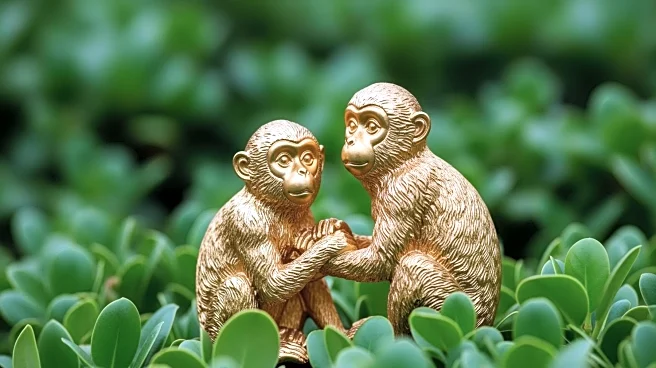What's Happening?
China has introduced its rare golden snub-nosed monkeys to European zoos, marking a new chapter in its diplomatic animal exchanges, traditionally dominated by pandas. These monkeys, known for their distinctive
orange manes and blue faces, have been sent to zoos in France and Belgium on a 10-year loan. This initiative follows the historical precedent of 'panda diplomacy,' where China uses animal exchanges to foster international relations. The golden monkeys are part of a broader effort to promote scientific and conservation collaboration between China and European countries. The zoos involved are working on joint research and conservation programs, similar to those established for pandas. The monkeys' arrival coincides with the 60th anniversary of diplomatic relations between China and France, highlighting the cultural and diplomatic significance of these exchanges.
Why It's Important?
The introduction of golden snub-nosed monkeys to European zoos represents a strategic move by China to enhance its soft power and international influence. By expanding its animal diplomacy beyond pandas, China is fostering goodwill and scientific collaboration with European nations. This initiative could lead to increased conservation efforts and awareness for endangered species unique to China. However, it also raises ethical concerns about the welfare of animals transported for diplomatic purposes. The success of this program could pave the way for similar exchanges in the future, potentially strengthening China's global image and influence.
What's Next?
The zoos in France and Belgium are expected to continue developing their conservation and research programs in collaboration with Chinese authorities. These efforts aim to benefit the species and promote international scientific cooperation. The success of these programs could influence future diplomatic animal exchanges and conservation initiatives. Additionally, the welfare of the animals will be closely monitored, with potential adjustments to ensure their health and well-being. The broader impact of this initiative on China's diplomatic relations and global image will be observed over the coming years.
Beyond the Headlines
The use of animals in diplomacy highlights the intersection of cultural, ethical, and political considerations. While these exchanges can promote conservation and international cooperation, they also raise questions about the ethical treatment of animals used for diplomatic purposes. The long-term impact on the species and individual animals involved will be a critical factor in evaluating the success of such programs. Furthermore, the cultural significance of these animals in China adds another layer to their role as diplomatic ambassadors.











